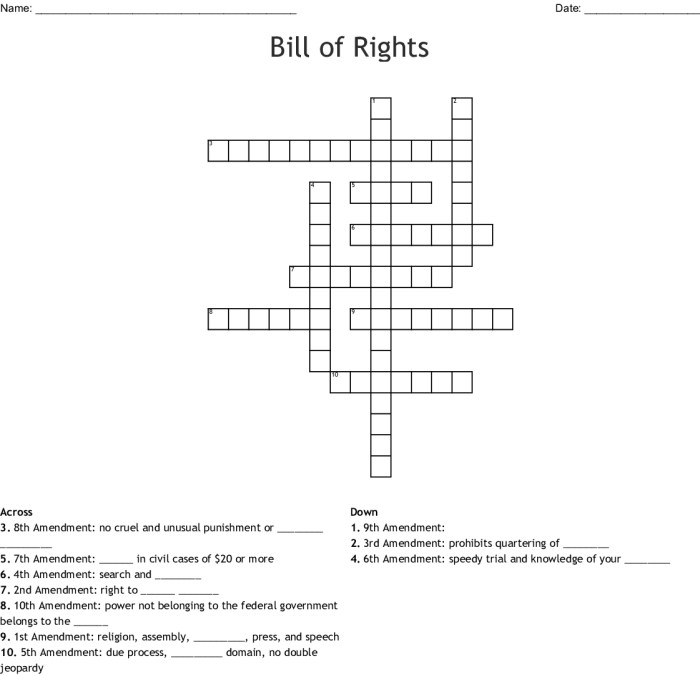The Last Amendment in the Bill of Rights Crossword provides an engaging and interactive way to explore the significance of the First Amendment within the Bill of Rights. Through a series of crossword puzzles, learners can delve into the historical context, purpose, and protections afforded by this cornerstone of American democracy.
This crossword puzzle not only tests knowledge but also fosters a deeper understanding of the First Amendment’s role in safeguarding freedom of speech, press, religion, assembly, and petition. By solving the puzzles, learners will gain insights into the limitations and exceptions to these freedoms, as well as the ongoing debates and challenges surrounding their interpretation in contemporary society.
The First Amendment: Rights and Freedoms: The Last Amendment In The Bill Of Rights Crossword

The First Amendment to the United States Constitution, ratified in 1791, is a cornerstone of American democracy and civil liberties. It guarantees essential rights and freedoms, including:
Freedom of Speech and Expression, The last amendment in the bill of rights crossword
The First Amendment protects the right to express oneself freely through speech, writing, and other forms of expression. This includes the right to criticize the government, engage in political discourse, and share one’s ideas and opinions.
Freedom of the Press and Media
The First Amendment safeguards the freedom of the press to publish and distribute information without government interference. This right ensures that the public has access to a diversity of viewpoints and that journalists can report on matters of public interest without fear of censorship.
Freedom of Religion and Belief
The First Amendment establishes the separation of church and state, protecting individuals’ right to practice their religion freely and without government interference. It prohibits the government from establishing an official religion or favoring one religion over another.
Freedom of Assembly and Petition
The First Amendment guarantees the right to assemble peacefully and petition the government for redress of grievances. These rights are essential for political participation and the expression of dissent.
Essential Questionnaire
What is the purpose of the First Amendment?
The First Amendment protects the fundamental freedoms of speech, press, religion, assembly, and petition, ensuring that individuals can express their views, access information, and participate in the political process without government interference.
What are the limitations to freedom of speech?
While the First Amendment protects free speech, certain categories of speech, such as obscenity, child pornography, incitement to imminent lawless action, and defamation, are not protected.
How does the First Amendment protect freedom of the press?
The First Amendment prohibits the government from censoring or suppressing the publication of information, ensuring that the press can report on matters of public interest without fear of reprisal.
What is the significance of the separation of church and state?
The First Amendment’s establishment clause prohibits the government from establishing an official religion or favoring one religion over another, ensuring that individuals are free to practice their faith without government interference.